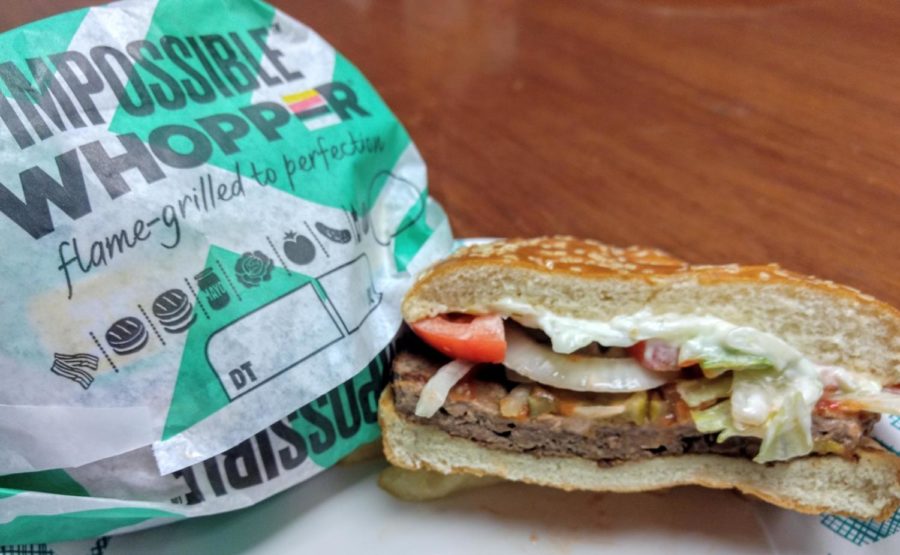Meatless foods meet fast-food chains
Burger King’s “Impossible Whopper” is a breakthough in non-beef burger alternatives.
So what’s with these new “impossible” foods?
You may have seen in the news that restaurants all over the country are adopting the new trend in meatless foods. The two main manufacturers currently are Impossible Foods and Beyond Meat.
One of the first forays into this trend was Burger King, with its Impossible Whopper. The Impossible Whopper has 0% beef, and the burger has made news headlines and influenced other fast food market chains.
Not only have restaurants like Burger King picked up this new trend, but other chains such as Qdoba, Del Taco, Subway, and KFC have started partnerships with Impossible Foods. In more recent news McDonald’s rolls out its own meatless Beyond Burgers in Canada.
“As customer interest in plant-based options accelerated rapidly, our curiosity piqued, too,” McDonald’s executive Ann Wahlgren said in a recent statement. “We’ve kept an eye on this emerging trend and now we’re ready to learn more by running a test in one of our markets.”
In general, eating vegetables is good for you. Right? Most fast food consumers think it’s obvious that plant-based meat is healthier than regular meat. But that’s not entirely true. Plant-based food options are completely safe to eat, but should not be labeled as a “health food.” While meatless meat alternatives may avoid the health risks of red meat and GMO’s, the nutritional contents of both items stay close to the same. While cholesterol levels in a typical Whopper vary from 90 mg vs 10 mg in the meatless options, the calorie and fat contents stay the same. Is the health trade off worth it? Would you be willing to sacrifice the savory taste of a normal cheeseburger?
Whether or not you vouch for living a meat based or vegetarian lifestyle, the environmental benefits are substantially higher than that of meat options. The food company, Beyond Meat, the makers of non-GMO meat-free burgers, sausages, and chicken strips–discovered that the switch is more environmentally friendly in a study conducted by the Center for Sustainable Systems at the University of Michigan. Researchers analyzed greenhouse gas emissions, energy use, water consumed, land use, and even packaging. The team of researchers discovered that the Beyond Burger generates 90% less greenhouse gas emissions, requires 46% less energy and has 99% less impact on water scarcity and 93% less effect on land use than a quarter pound of U.S. beef.
The American fast-food consumers are always constantly looking for new meat substitutes such as Beyond Meat and the Impossible Burger. The plant-based meat industry saw record-high sales at $670 million in the last year and up 24% from the year before, reports the Plant-Based Foods Association. The overall plant-based industry has seen a jaw-dropping $3.7 billion in sales.
This kind of economic potential has attracted many of the large fast-food chains we see every day. Currently, in Canada, McDonald’s is testing out its own version of a plant-based burger to compete with Burger King’s Impossible Whopper. Even Qdoba has released their new Impossible Burrito to keep up with the recent fast-food market trends.

















